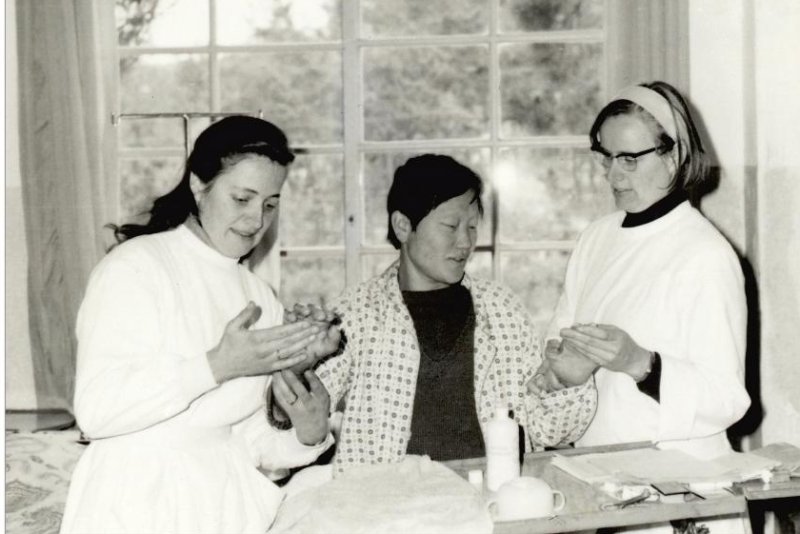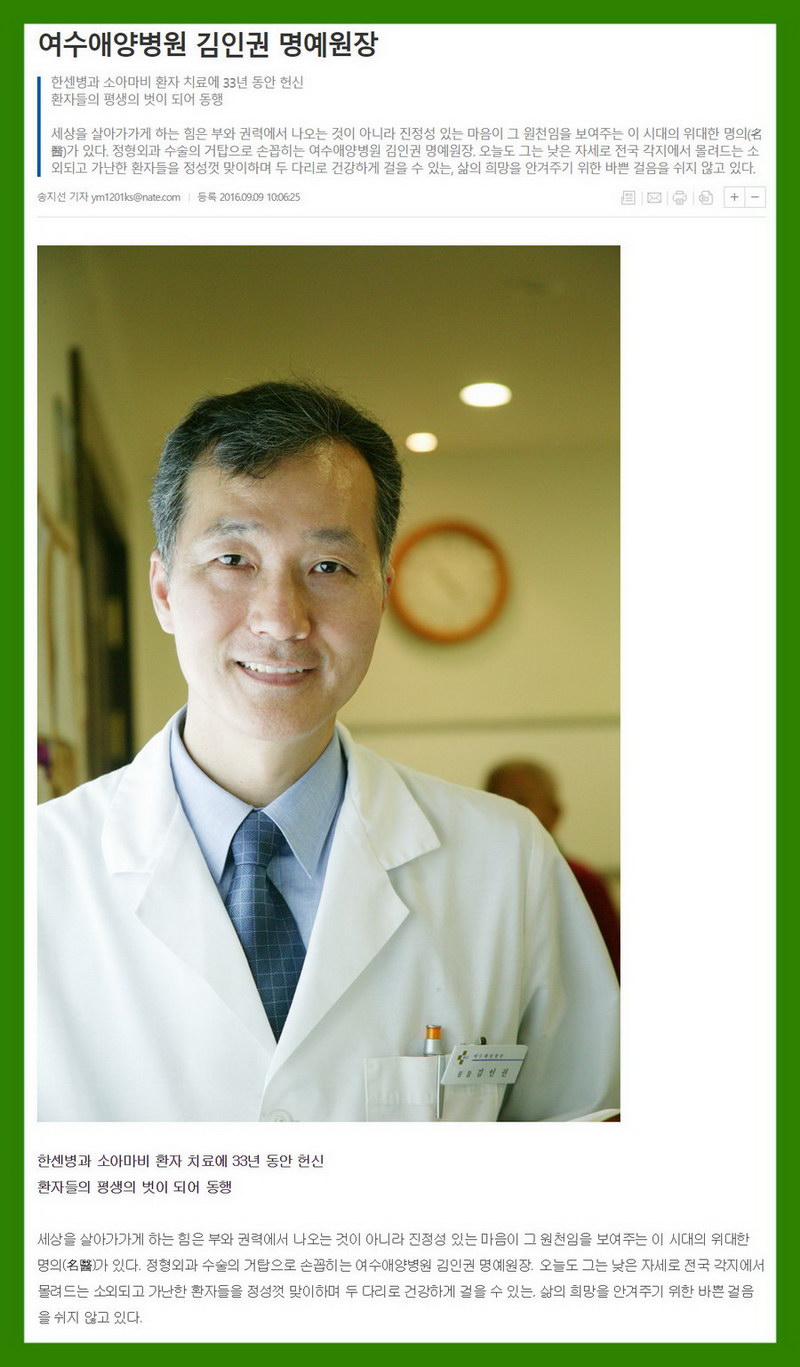SOROK ISLAND, South Korea, Dec. 17 (UPI) -- The sound of music rings out from a modest home on this tiny island, not much bigger than New York's Central Park, off the southwestern coast of South Korea.
The setting is an idyllic one, with pine trees, beaches and clear water glinting under a crisp blue late-autumn sky. But for 73-year-old Chung Bong-up, coming to Sorok Island in 1975 was a fate that seemed worse than death.
The island, called Sorokdo in Korean, was at that time a colony for sufferers of Hansen's disease (leprosy), a dehumanizing prison where patients were exiled by a society that still deeply stigmatized the illness.
"I felt like I lost everything in my life," Chung said of being sent here. "It felt like the sky was falling down."
Chung, who was blinded by the disease, plays piano at the island's church, practicing songs and hymns at home for two hours a day even though his hands have long ago grown stiff. On the walls of the small home he shares with his wife, Lee Gong-soon, who also once suffered from Hansen's, are religious images, family photos and an autographed image of Pope John Paul II.
One framed photograph, however, has a place of honor on a separate wall apart from the rest. It is a black-and-white snapshot of two Austrian nurses, Marianne Stoeger and Margaritha Pissarek, who arrived on Sorok Island in the 1960s and would spend the next four decades here treating Hansen's patients with a compassion and care they had not received anywhere else.
"They were our saviors," Chung said. "The other nurses and doctors in the hospital wouldn't touch us with their bare hands. They wore two sets of gloves. But these two nurses would touch us and treat us well. They treated me like a person."
Stories abound on Sorokdo of the kindness of the blue-eyed nurses who kept their clinic door open at all times and held birthday parties for their patients, all while working tirelessly to remove the shame and fear surrounding Hansen's disease.
Stoeger, now 85, and Pissarek, 84, returned to Austria in 2005. They have received several awards from the South Korean government and were made honorary South Korean citizens in 2016.
Now a movement aims to give them the highest accolade of all: a Nobel Peace Prize. More than 1 million signatures have been added to a petition, and a committee headed by former South Korean Prime Minister Kim Hwang-sik will send a formal submission to the Norwegian Nobel Committee before the end of January.
"Many Koreans have been voicing their opinions that we must not forget the generosity [Stoeger and Pissarek] have shown us," Kim said at a press conference at the end of October. "Spending most of their lives from their 20s to their 70s helping those who are in great need, in a country far away from their homes, is a truly noble way to practice love for mankind."
A world of pain and suffering
The Rev. Kim Yeon-jun, 51, a Catholic priest who heads the Marianne and Margaretha Association, a charity group founded in the nurses' honor, said that the situation when the two arrived on Sorokdo was bleak.
"Many patients were committing suicide," said the priest, who grew close to Stoeger and Pissarek while working at the church on Sorokdo and has been instrumental in their Nobel nomination. "They were in pain from being abandoned by their families. They were also suffering physically. There wasn't enough medication. It was too expensive and South Korea was still very poor then."
Stoeger originally came to Sorokdo in 1962 and then returned in 1966 along with Pissarek under a five-year project with the Damien Foundation, a Belgian NGO that works to treat leprosy around the world.
After that project ended, the two decided to stay on and raised funds on their own for medical supplies and drugs, as well as clothing and other living costs for the patients, primarily through the Austrian Catholic Women's Group.
The nurses receiving specialized training in India and France and treated patients with modern techniques, administering medicine and soothing effects of the disease such as skin ulcers. Hansen's affects the nerves, skin, eyes and nasal lining and can lead to blindness, crippling of hands and feet and disfigurement of the nose if not treated.
Stoeger and Pissarek also played a leading role in spreading the information in South Korea that Hansen's disease is curable and not highly contagious. In fact, some 95 percent of people have a natural immunity to the disease, an infection caused by a slow-growing bacteria, according to the Centers for Disease Control and Prevention.
With the funds they raised, Stoeger and Pissarek opened a childcare facility for the children of Hansen's disease patients on the island, who were kept separated from their parents, and improved hospital facilities, adding wards for mental health and tuberculosis. They even developed farms for the cured patients who stayed on the island and helped others to rejoin society with financial support.
Perhaps most importantly, Kim said, they made the patients feel cared for and gave them a sliver of hope in a dark place.
"Marianne and Margaritha had the effect of turning a dark situation brighter," he said. "They were full of love and caring. They never gave up on the patients, even in the direst circumstances. And in the middle of all this despair and pain, people could still have hope for life."
A dark history
The legacy of Sorokdo is one of the darker chapters in South Korea's history. The hospital was first opened in 1916 by the occupying Japanese colonial forces, and patients brought there were subjected to brutal, prison camp-like conditions. Forced labor, sterilization and abortions were the norm, and patients were experimented on while alive and dissected without consent after death.
Similar policies were carried forward for decades even after South Korea regained control of the country as fear of the disease remained profound. The condition was believed to be hereditary and any patients who managed to have children were immediately separated from them. Numerous victims of Hansen's disease have since filed lawsuits against the government over human rights violations stemming from the forced abortions and sterilizations.
At its height in the 1940s, there were 6,000 patients quarantined on Sorokdo, and there were still some 5,000 inhabitants by the time Stoeger and Pissarek arrived. Today around 500 former patients such as Chung remain on the island, where their living expenses are paid by the South Korean government.
Traces of the two nurses remain everywhere on Sorokdo. The room where they treated patients has been left intact, with the wall calendar permanently showing November 2005, the month they returned to Austria after leaving just a simple note behind.
A museum that traces the history of Sorokdo features a section dedicated to Stoeger and Pissarek, while their home has been preserved as they left it, sparsely decorated with ink drawings of Korean characters meaning "love" and "nothing," tributes to a life of humility. Neither were ordained as nuns, but they took vows of poverty as members of Handmaids of Christ the King of the Catholic Church.
Yoo Bu-Rim, 42, a dental hygienist who began working at the Sorokdo National Hospital alongside Stoeger and Pissarek in 1999, said that observing the two Austrian nurses helped her overcome her own fears about working with former Hansen's sufferers.
"My job deals with a lot of blood, and at first I was so worried," she said. "But when I saw how they treated the patients, I realized it was not a big deal."
Yoo also was struck by the fact that the nurses often referred to the patients as "beautiful."
"I don't think they meant their outward appearances necessarily," Yoo said. "But the way the patients acted and what was in their hearts. They were able to see them as beautiful."
In support of nurses
Support for the Nobel nomination has been led by the nursing community within Korea and internationally. The Korean Nurses Association has been at the forefront of promoting the campaign for Stoeger and Pissarek, and the cause has been picked up the International Council of Nurses, a federation of more than 130 national associations.
For many, a Nobel Peace Prize would be long overdue recognition for the profession, and the year 2020 would make a fitting time, as the World Health Organization has officially designated it as "The Year of the Nurse and Midwife."
Austrian Ambassador to South Korea Michael Schwarzinger said the work of nurses such as Stoeger and Pissarek comes not only from caring hearts but also high professional competence, which the Nobel Prize would recognize.
"When Marianne and Margaritha touched the patients on Sorok Island with their bare hands, they didn't do so out of disregard for risk, but because they were trained in the latest caring techniques for patients of Hansen's disease," he said. "We should not romanticize this profession. They should receive our respect and our recognition. This is a very, very important profession for the well-being of the world."
Nurses and midwives account for nearly half of the global health workforce, according to the WHO, which estimates the world will need an additional 9 million practitioners by 2030 to reach sustainable development goals.
Marianne Watkins, chairwoman of the WHO-led Nursing Now, a global campaign to support and promote nursing, said Stoeger and Pissarek have tried to stay as far from the spotlight as possible but that the Nobel would give much-needed attention to the crucial role nursing plays.
"The fact that they lived in such humility means even now, that they are slightly reluctant for us to proceed with this nomination," she said. "They may not appreciate [the Nobel nomination] as much as the profession as a whole because it would shine a light on the work nurses are doing now and in the future under the same circumstances."
Kim said that a Nobel Peace Prize for the two nurses would be a powerful example for turbulent times.
"The way to stop wars and conflicts is through sharing, dedication and love," he said. "Sometimes I question whether there is hope for humanity. When I look at these nurses, it reminds me that we have caring and love in our DNA."














I saw this news at my cellphone today.
The Sorok-Do, I had heard a lot during my younger days in Korea.
I don't remember where and when but in my faint memory,
I might have heard a story about two nurses in Sorok-Do long time ago.
At this news of today, I couldn't help my eyes getting warm and wet.
Such a pair of beautiful people... God bless them.
I wish their kind and gracious humanity get recognized all over the world.
PS: I've been away for a while due to some personal matter. Sorry about that.